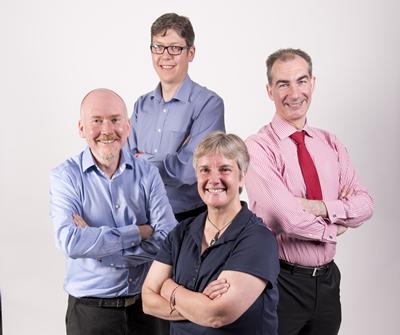National Teaching Fellowships honour excellence in education

The Higher Education Academy has honoured three of the University of Southampton’s leading academics by awarding them with prestigious National Teaching Fellowships.
Professorial Fellow David Read from Chemistry, Associate Professor Dr Judith Holloway from Medicine and Lecturer in Mental Health James Wilson from Health Sciences have all been recognised for their individual excellence, for raising the profile of excellence and for developing excellence throughout their careers.
Southampton Professor Simon Kemp, head of the University’s Centre for Environmental Science and leader of Southampton’s NTF Scheme programme, praised his colleagues’ success.
“I couldn’t be more thrilled for our three newest National Teaching Fellows,” said Professor Kemp, awarded a National Teaching Fellow himself in 2010. “I’ve worked with them all and they’re all equally inspirational. The quality of their work is genuinely, nationally leading and for the University of Southampton to be just one of two UK universities to have three new National Teaching Fellows awarded this year is testament to the quality of these individuals personally and professionally.”
Professor David Read’s goal is to bring chemistry to life and make it accessible to students through creative use of technology, breaking down barriers that hinder progress when studying the subject. His many contributions to innovative teaching and learning include the introduction of in-class voting technology, lecture capture and ‘flipped’ teaching (reversing typical lecture and homework elements of a course).
“It’s an immense honour to receive a National Teaching Fellowship,” said Professor Read. “Many of the people who have inspired me in the Chemical Education field are National Teaching Fellows themselves so to become one and, hopefully, to be able to inspire other people to pursue that goal in the future is a fantastic privilege.
“We’re very fortunate to live in an era of rapid technological advancement and the power now that students have in their pocket in the form of a mobile phone is something we can harness in education,” he continued. “So it’s essential as educators that we stay at the cutting edge and always look for even newer ways to continue to use that technology to ensure that our students can maximise their potential.”
Dr Judith Holloway has been instrumental in transforming the understanding of allergy through her extraordinarily successful MSc in Allergy at the University, the only Centre of Excellence recognised by the World Allergy Organisation (WAO). Dr Holloway is passionate about giving doctors, nurses and dieticians the knowledge and skills to save lives and implement best practice.
“It’s such an honour to receive this award,” said Dr Holloway. “I love being able to parcel my knowledge in such a way that my students – GPs, nurses, consultants and dieticians - can use that knowledge and make use of it for their clinical practice.
“All of them are working daily to make patients’ lives and their clinical services better and I love the fact that through our course, they can improve the quality of life for thousands of patients around the world,” she continued.
As a registered mental health nurse with experience in the police, James Wilson has utilised his public sector background and pioneered the use of a range of interactive theatre techniques to link ‘difficult to teach’ theory to the complexities of clinical practice. His highly innovative techniques provide immersive and powerful tools that allow students to explore and change outcomes of real healthcare practice scenarios.
“Receiving a National Teaching Fellowship is an extremely distinguished honour and it is so great to receive it on behalf of so many of my wonderful colleagues who I’ve worked with over the years,” said Wilson. “I’m acutely aware that while this is an individual award, you never innovate alone; it’s something you achieve with key experts in the field to hopefully provide some engaging and inspiring teaching and learning experiences.
“One of the great things about teaching, and certainly what I enjoy when I approach teaching, is thinking about the students’ development and really getting them involved in each session as much as possible,” he continued. “This is why I use a myriad of interactive theatre techniques to try and get students up and out of their seats and involved in the action.”